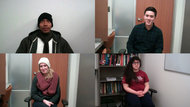Congratulations to CLBB Faculty and Northeastern University Professor Lisa Feldman Barrett, who was recently selected by the Foundation for Personality and Social Psychology (FPSP) and the Society for Personality and Social Psychology (SPSP) to receive the 2014 Carol and Ed Diener Award in Social Psychology. This award is designed to recognize a scholar (approximately 15-25 years from their first tenure-track appointment) whose work has added substantially to the body of knowledge to the social psychology field and/or brings together personality psychology and social psychology. Continue reading »
Lisa Feldman Barrett receives Diener Award
- Category: Press
- Tags: Lisa Feldman Barrett | pain | psychology
- Date: August 22, 2014
- Author: admin2
CLBB to lead Pain, Juvenile Justice Interdisciplinary Working Groups
Our understanding of the neuroscientific underpinnings of the human brain is evolving at a rapid rate. This ongoing development presents many challenges for its timely, successful translation into law and policy. In 2014-2015, the Center for Law, Brain, and Behavior, through the support of the Harvard Mind Brain Behavior Interfaculty Initiative, will convene faculty working groups to incite scholarship into two translational gaps in neuroscience and law: pain and suffering, and the juvenile brain. The groups, drawing from the Harvard Law and Medical Schools and Harvard University Psychology Faculty, will convene for ongoing expert faculty meetings, academic publications, and a public seminar event. The groups represent CLBB’s initial ventures into pain and juvenile justice as ongoing program areas. Continue reading »
- Category: Press
- Tags: amanda-pustilnik | David Borsook | Gene Beresin | Gina Vincent | juvenile justice | Leah Somerville | Lisa Feldman Barrett | margaret sheridan | mind brain behavior | pain | robert kinscherff | thomas grisso | working groups
- Date: May 10, 2014
- Author: admin2
At Airports, a Misplaced Faith in Body Language

Interactive Feature | Can You Spot the Liar? Subjects in a study on body language and lying were asked several general questions — and then told off camera to lie or tell the truth when answering. Can you tell truth from falsehood?
Like the rest of us, airport security screeners like to think they can read body language. The Transportation Security Administration has spent some $1 billion training thousands of “behavior detection officers” to look for facial expressions and other nonverbal clues that would identify terrorists.
But critics say there’s no evidence that these efforts have stopped a single terrorist or accomplished much beyond inconveniencing tens of thousands of passengers a year. The T.S.A. seems to have fallen for a classic form of self-deception: the belief that you can read liars’ minds by watching their bodies.
- Category: News
- Tags: facial recognition | Lisa Feldman Barrett | lying | security | truth-deception
- Date: March 24, 2014
- Author: The New York Times and admin2
What Faces Can’t Tell Us
Can you detect someone’s emotional state just by looking at his face?
It sure seems like it. In everyday life, you can often “read” what someone is feeling with the quickest of glances. Hundreds of scientific studies support the idea that the face is a kind of emotional beacon, clearly and universally signaling the full array of human sentiments, from fear and anger to joy and surprise.
Increasingly, companies like Apple and government agencies like the Transportation Security Administration are banking on this transparency, developing software to identify consumers’ moods or training programs to gauge the intent of airline passengers. The same assumption is at work in the field of mental health, where illnesses like autism and schizophrenia are often treated in part by training patients to distinguish emotions by facial expression.
But this assumption is wrong. Several recent and forthcoming research papers from the Interdisciplinary Affective Science Laboratory, which I direct, suggest that human facial expressions, viewed on their own, are not universally understood.
Read the full article by CLBB Faculty and Northeastern University Psychologist Lisa Feldman Barrett in the New York Times. Published February 28, 2014.
UC Berkeley psychologists and leading facial expression researchers Paul Ekman and Dacher Keltner submitted a response to Feldman Barrett’s research findings on March 11, 2014. Read the letter to the editor here.
- Category: Uncategorized
- Tags: adaptation | Affective Science Lab | Darwin | emotion | facial recognition | Lisa Feldman Barrett | neuroprediction | Paul Ekman
- Date: March 12, 2014
- Author: Lisa Feldman Barrett
Over the Side With Old Scientific Tenets
Here are some concepts you might consider tossing out with the Christmas wrappings as you get started on the new year: human nature, cause and effect, the theory of everything, free will and evidence-based medicine.
Those are only a few of the shibboleths, pillars of modern thought or delusions — take your choice — that appear in a new compendium of essays by 166 (and counting) deep thinkers, scientists, writers, blowhards (again, take your choice) as answers to the question: What scientific idea is ready for retirement?
The discussion is posted at edge.org. Take a look. No matter who you are, you are bound to find something that will drive you crazy.
- Category: Press
- Tags: essentialism | essentialist view of the mind | future of science | Lisa Feldman Barrett | models of the mind | philosophy
- Date: January 14, 2014
- Author: admin2





